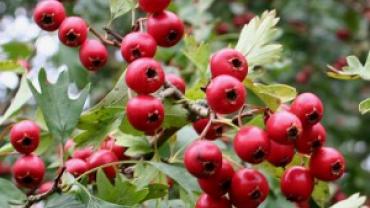
Botanical medicine has long valued hawthorn extract (Crataegus oxyacantha) for its positive effects on heart health. Hawthorn's beneficial properties are so well-recognized that in some European countries it is offered as a pharmaceutical drug. Animal and human trials have demonstrated positive results from hawthorn extracts including reduced angina greater left ventricular ejection fraction (LVEF) and increased exercise tolerance. Hawthorn has a number of properties that account for these effects which make it a useful complement to conventional treatments for heart health.
A critical factor in cardiovascular function is blood vessel integrity and the vessel's ability to accommodate sufficient blood flow. Hawthorn may be beneficial here as it has been shown to influence vasodilation. A study that looked at rat aortas and human mammary arteries found that hawthorn extract induced vasodilation by stimulating the release of endothelial nitric oxide synthase (eNOS) with nitric oxide well recognized as a potent vasodilator. The herb is also known to be a positive inotropic agent strengthening the contraction of the heart muscle. The combination of stronger contraction and reduced peripheral vascular resistance could be responsible for hawthorn's beneficial effects on hypertension and angina.
One study showed promising effects of hawthorn on the progression of heart failure in an animal model. High-dose hawthorn reduced negative cardiac remodeling induced by aortic constriction. Specifically at the highest dose studied hawthorn led to favorable effects on ventricular size and systolic function. The authors noted that the medium and high doses tested led to the ventricles being better able to contract after aortic constriction and reduced a maladaptive form of hypertrophy.They proposed that this was due in part to the vasodilatory effects of hawthorn but also suggested these positive observations could be the result of mitochondrial protection afforded by hawthorn. Hawthorn leaves berries and flowers are rich sources of oligomeric proanthocyanidins potent antioxidant flavonoids that have been shown to reduce oxidative stress in reperfused myocardium and may also inhibit apoptosis exerting a protective effect on cardiac tissue. Another author suggested that hawthorn's high flavonoid content helped stabilize blood vessel collagen.
In addition to its effects on the cardiac tissue and vasculature itself hawthorn has been shown to have beneficial effects on hyperlipidemia. A broad review includes studies that showed hawthorn to have triglyceride total cholesterol and LDL-lowering properties.
A prospective comparative cohort study of heart failure patients found significant decreases in fatigue palpitations and shortness of breath (stress dyspnea) in the group taking hawthorn as compared to the control group. These results are especially interesting because the intervention group as a whole was being treated with fewer pharmaceutical drugs including beta-blockers ACE inhibitors and diuretics.
In regards to heart attacks hawthorn extract was shown to have beneficial effects on heart damage markers in a rat model of myocardial infarction. Pre-treatment with hawthorn extract for 60 days resulted in reduced apoptosis reduced serum lactate dehydrogenase (LDH) and creatine kinase (CK) levels and increased antioxidant status along with decreased lipid peroxidation in the heart. With this in mind hawthorn could be a beneficial adjunct to a proper diet and a lifestyle of stress management and sufficient exercise as part of a heart protection protocol.